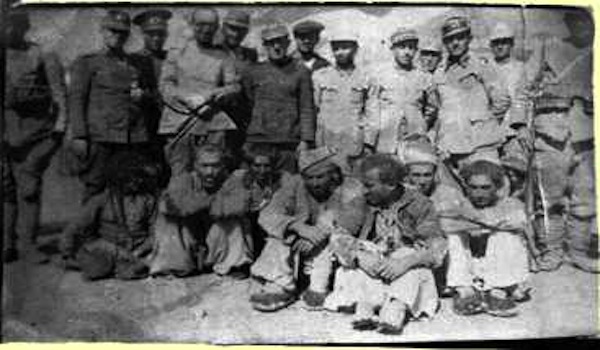 By Emiko Jozuka for SES Türkiye in Ercis – Southeast European Times / 22.6.2012
By Emiko Jozuka for SES Türkiye in Ercis – Southeast European Times / 22.6.2012
The noise of a small river running over stones and an occasional birdsong are the only sounds that seep into the rural valley of Zilan. Few are aware of, or even remember that in July 1930, the same valley bore witness to unprecedented slaughter. Mehmet Tastan, 94, still vividly remembers the fateful day that a simple trip to deliver food to his father working in the fields turned into a nightmare he barely managed to survive.
“They [the soldiers] rounded people up in Kunduk valley. People were being killed with rifles and machine guns. I wasn’t able to do anything, I could only watch what went on from afar,” Tastan told SES Türkiye. “We weren’t guilty of anything. Even at this age, I don’t know why; I can’t understand why that many people were killed.” An understudied and largely undisclosed chapter in Turkey’s history, little light has been shed on the devastating Zilan Massacres, which were carried out in response to the Kurdish uprising in Ağri province in 1930.
At Zilan, systematic killings of Kurdish men, women and children were followed by imprisonments, exile of whole families and villages to western Turkey and property confiscations.
From the founding of the republic to 1938, Turkey faced 18 revolts, 17 of which occurred in eastern Anatolia; 16 involved Kurds. Along with the Sheikh Said Rebellion (1925) and Dersim (1937-38), the events surrounding Zilan were one of several acts of violence directed against the Kurds during the early years of the Republic as the state sought to consolidate control.
Eighty-two years after the destruction of 44 villages and the deaths of 15,000 Kurds according to official records, and 47,000 deaths cited by local sources, efforts are being made to raise awareness of Zilan.
Prompted by local Mehmet Gurbuz, who has applied to the European Court of Human Rights (ECHR) in order to make the massacres known and reclaim confiscated property, other descendants of massacre victims are slowly preparing to present their cases to the ECHR. Yet a deeply ingrained fear and a lack of central organisation still prevents many from speaking out against the atrocities committed against their ancestors.
According to the author of the book Agri Rebellion and the Zilan Massacre, published in 2010, Sedat Ulugana — himself a massacre victim descendent — little has been done by the government to uncover what really happened in Zilan.
“The number of people killed at Zilan is more than that of Dersim, but the government doesn’t want this to be known because then it might have to pay compensation to people. In any case, people here are still too scared to apply to the ECHR,” explained Ulugana. He asserted that he was determined to voice the wrongdoings committed against Kurds in 1930, and open up a previously silenced chapter in history.
Yet breaking this silence has not been easy. Along with the one-party state that prevailed in Turkey until 1946, the untouchable notion of Turkishness, periods of military rule and martial law in the southeast silenced dissident voices who dared speak out against the state or claim a different identity.
“If one asks why there isn’t enough research on [Zilan], the reason is that people lived in oppression for a long time. Until ten years ago, you wouldn’t even have easily come across the name Zilan — you wouldn’t even have been able to say Zilan, or say that you were Kurdish,” explained lawyer and former president of the Muş Human Rights Organisation, Vedat Sengol.
Although locals are slowly mobilising and preparing to submit their cases to the ECHR, Sengol said that without effective organisation, it would be difficult to bring the Zilan case into the international spotlight.
“Mehmet Gurbuz’s case was a step in the right direction. There a few more cases similar to his but we should gather these together in a more organised way. There should be a civil society that can research this topic. People with an interest in this matter could come together and found a research institute. Such a presence would be stronger than proceeding with the research alone,” he explained.
“The archives to do with Dersim have only been accessible to researchers in the last two years, and information has only recently been open to the media and the public,” continued Sengol.
In early June, the Turkish General Directorate of Police announced it was handing over nearly 500,000 files consisting of 250 million documents dating from before 1963 to the State Archives. The files, which will be open to the public, could help to shed light on darker episodes in Turkey’s history, including the Kurdish rebellions and Zilan.
In an unprecedented move last November, Prime Minister Recep Tayyip Erdogan apologised on behalf of the state for the events surrounding Dersim, in which at least 13,000 Kurds were killed. The apology opened that previously closed chapter in Turkish history and paved the way for public discussion. The apology was interpreted as a possible prelude to apologies for other atrocities committed under the Turkish Republic.